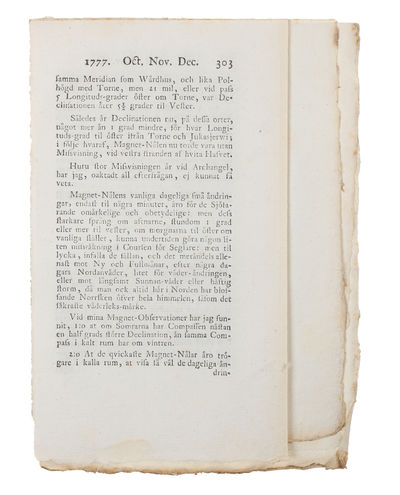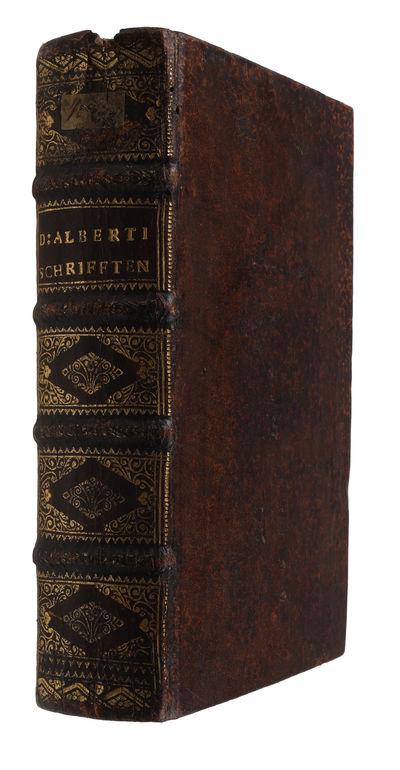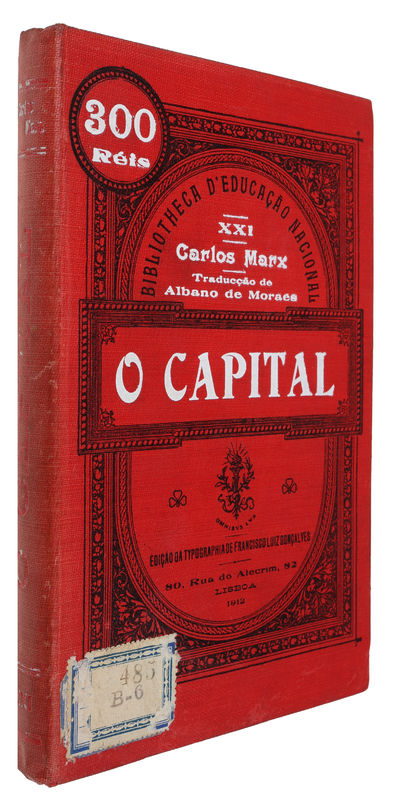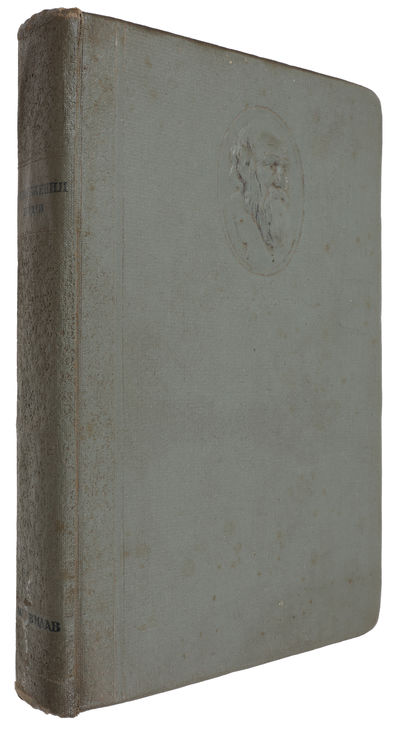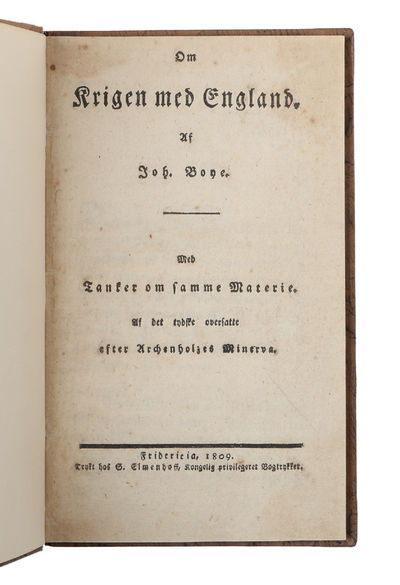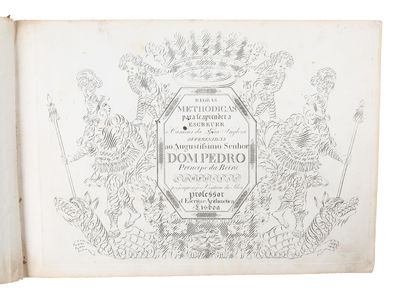LEIBNITZ, Mr. de (GOTTFRIED WILHELM LEIBNIZ).
Oeuvres philosophiques latines & francoises de feu. Tirées de ses manuscrits qui se conservent dans la bibliotheque royale a Hanovre et publiées par Mr. Rud. Eric Raspe. Avec une Préface de Mr. Kaestner. [Nouveau essais sur l'entendement humain, -New ... - [FIRST PRINTING OF "NEW ESSAYS ON HUMAN UNDERSTANDING"]
Herman H. J. Lynge & Søn A/S
lyn38096
Amsterdam et Leipzig, Chez Jean Schreuder, 1765. 4to. Uncut in the original marbled boards. Professionally rebacked preserving almost all of the original back. The fragile orginal binding is here preserved in its entirety, and it has quite a bit of overall wear. Apart from a small hole to two leaves in the index, affecting ab. one work on each of the four pages, it is internally nice and clean. Title-page printed in red and black. Beautiful eng. title-vignette and a few other woodcut vignettes and initials. (4), XVI, (2), 540, (18) pp.
First edition thus, being the first collected edition of Leibnitz' philosophical works in French and Latin, and containing the FIRST PRINTING of one of Leibnitz' most important philosophical works, his "Nouveaux essays sur l'entendement humain" (New Essays on Human Understanding), in which he attacks and refutes Locke and his "Essay on Human Understanding" and gives important testimony to his own philosophical ideas. With its 496 pages, this extensive work takes up most of this collection of philosophical works, and it also constitutes one of his largest and most important of his philosophical works. As explained by Raspe, the editor, in his preface to this publication, "LES NOUVEAUX ESSAIS SUR L'ENTENDEMENT HUMAIN, qui sont la partie principale de recueil, sont connûs trés imparfaitement par l'histoire de la Philosophie de Leibnitz, que Mr. Ludovici a publiée" (p. X), and the reason why the work was known, even though it had not been published, is because of a letter that Leibnitz had written in 1714, in which he explains why he did not wish to publish the work. Raspe quotes the letter (p. X), from which it becomes clear that Leibnitz had not wished to publish an attack on Locke and his work, because Locke had died in 1704 (the same year that Leibnitz had actually written the work), and because Leibnitz was against publishing refutations of dead authors: "Mais je me suis degouté de publier des refutations des Auteurs morts, quoiqu'elles dissent paroitre Durant leur vie & étre communiqués à eux memes". Raspe points to the nobleness of this decision, but he also points to what could be other reasons for Leibnitz not wishing to publish his seminal work, one of them being that towards the end of his life (he died in 1716), he did not wish to enter into any more controversies with the British, since he was already engaged in two very important ones that occuopied much of his time and energy: The first concerned the invention of the differential calculus, the second was against Mr. Clarke on liberty and important metaphysical and theological questions. Another reason could also be that he did not want to begin controversies with the friends of Locke, who at that time were many and important.Locke's "An Essay Concerning Human Understanding", which is the work here being refuted by Leibnitz, became the crucial groundwork for the future empiricists with David Hume in the foreground, and thus Leibnitz' work, though published posthumously, probably came to play a bigger role in the history of philosophy than it would have done had it been published just after he wrote it. Few philosophers of his time were susceptible to Leibnitz' ideas and his application of logic to the problems of metaphysics, as most of them were far more receptive to Locke's empiricism. However, when Leibnitz' "Nouveaux essays..." was finally published here in his "Oeuvres philosophiques" in 1765, it became hugely influential and was also an important factor in the development of Kant's transcendental philosophy.The hugely famous work by Locke, in which he stated his famous theory that the mind of the newborn is like a blank slate (tabula rasa) and concluded that all ideas come from experience and that there are no such things as innate principles, was generally sharply criticized by the rationalists, the most important of them being Leibnitz. Leibnitz' response, his "Les nouveaux essays sur l'entendement humain" constitutes the most important of the rationalist responses and it is written in the form of a chapter-by-chapter refutation. He refutes the major premise of Locke's work, that the senses are the source of all understanding, primarily by adding to this "except the understanding itself", thus going on to distinguish between his three levels of understanding, which are part of the centre of his philosophy.For Leibnitz as well as for Locke the great inspiration was Descartes, but they chose two fundamentally different directions, Locke the materialistic one and Leibnitz the idealistic one. The present work represents the greatest clash between the two giants of late 17th century philosophy. The effect of Leibnitz' work was enormous, and among the Germans he invoked a great passion for philosophical studies. Leibnitz represents a striking contrast to both Locke with his empiricism and Spinoza. One earlier collection of some of Leibnitz' works had been printed before this one, but it did not contain his "New Essays on Human Understanding", and only consisted of his "Smaller Philosophical Works". This is the German 1740-edition "Kleinere philosohische Schriften". The other writings contained in this publication are "Examen du sentiment du P. Malebranche que nous voyons tout en Dieu", ""Dialogus de connexione inter res & verba", "Difficultates quaedam Logicae", "Discours touchant la methode de la certitude & de l'art d'inventer", "Historia et commendatio charactericae universalis quae simul sit ars inveniendi".Graesse IV:152.
First edition thus, being the first collected edition of Leibnitz' philosophical works in French and Latin, and containing the FIRST PRINTING of one of Leibnitz' most important philosophical works, his "Nouveaux essays sur l'entendement humain" (New Essays on Human Understanding), in which he attacks and refutes Locke and his "Essay on Human Understanding" and gives important testimony to his own philosophical ideas. With its 496 pages, this extensive work takes up most of this collection of philosophical works, and it also constitutes one of his largest and most important of his philosophical works. As explained by Raspe, the editor, in his preface to this publication, "LES NOUVEAUX ESSAIS SUR L'ENTENDEMENT HUMAIN, qui sont la partie principale de recueil, sont connûs trés imparfaitement par l'histoire de la Philosophie de Leibnitz, que Mr. Ludovici a publiée" (p. X), and the reason why the work was known, even though it had not been published, is because of a letter that Leibnitz had written in 1714, in which he explains why he did not wish to publish the work. Raspe quotes the letter (p. X), from which it becomes clear that Leibnitz had not wished to publish an attack on Locke and his work, because Locke had died in 1704 (the same year that Leibnitz had actually written the work), and because Leibnitz was against publishing refutations of dead authors: "Mais je me suis degouté de publier des refutations des Auteurs morts, quoiqu'elles dissent paroitre Durant leur vie & étre communiqués à eux memes". Raspe points to the nobleness of this decision, but he also points to what could be other reasons for Leibnitz not wishing to publish his seminal work, one of them being that towards the end of his life (he died in 1716), he did not wish to enter into any more controversies with the British, since he was already engaged in two very important ones that occuopied much of his time and energy: The first concerned the invention of the differential calculus, the second was against Mr. Clarke on liberty and important metaphysical and theological questions. Another reason could also be that he did not want to begin controversies with the friends of Locke, who at that time were many and important.Locke's "An Essay Concerning Human Understanding", which is the work here being refuted by Leibnitz, became the crucial groundwork for the future empiricists with David Hume in the foreground, and thus Leibnitz' work, though published posthumously, probably came to play a bigger role in the history of philosophy than it would have done had it been published just after he wrote it. Few philosophers of his time were susceptible to Leibnitz' ideas and his application of logic to the problems of metaphysics, as most of them were far more receptive to Locke's empiricism. However, when Leibnitz' "Nouveaux essays..." was finally published here in his "Oeuvres philosophiques" in 1765, it became hugely influential and was also an important factor in the development of Kant's transcendental philosophy.The hugely famous work by Locke, in which he stated his famous theory that the mind of the newborn is like a blank slate (tabula rasa) and concluded that all ideas come from experience and that there are no such things as innate principles, was generally sharply criticized by the rationalists, the most important of them being Leibnitz. Leibnitz' response, his "Les nouveaux essays sur l'entendement humain" constitutes the most important of the rationalist responses and it is written in the form of a chapter-by-chapter refutation. He refutes the major premise of Locke's work, that the senses are the source of all understanding, primarily by adding to this "except the understanding itself", thus going on to distinguish between his three levels of understanding, which are part of the centre of his philosophy.For Leibnitz as well as for Locke the great inspiration was Descartes, but they chose two fundamentally different directions, Locke the materialistic one and Leibnitz the idealistic one. The present work represents the greatest clash between the two giants of late 17th century philosophy. The effect of Leibnitz' work was enormous, and among the Germans he invoked a great passion for philosophical studies. Leibnitz represents a striking contrast to both Locke with his empiricism and Spinoza. One earlier collection of some of Leibnitz' works had been printed before this one, but it did not contain his "New Essays on Human Understanding", and only consisted of his "Smaller Philosophical Works". This is the German 1740-edition "Kleinere philosohische Schriften". The other writings contained in this publication are "Examen du sentiment du P. Malebranche que nous voyons tout en Dieu", ""Dialogus de connexione inter res & verba", "Difficultates quaedam Logicae", "Discours touchant la methode de la certitude & de l'art d'inventer", "Historia et commendatio charactericae universalis quae simul sit ars inveniendi".Graesse IV:152.
Adresse:
Silkegade 11
DK-1113 Copenhagen Denmark
Telefon:
CVR/VAT:
DK 16 89 50 16
Email:
Web:
![Oeuvres philosophiques latines & francoises de feu. Tirées de ses manuscrits qui se conservent dans la bibliotheque royale a Hanovre et publiées par Mr. Rud. Eric Raspe. Avec une Préface de Mr. Kaestner. [Nouveau essais sur l'entendement humain, -New ... - [FIRST PRINTING OF "NEW ESSAYS ON HUMAN UNDERSTANDING"] (photo 1)](https://d3525k1ryd2155.cloudfront.net/h/502/998/1035998502.0.l.jpg)
![Oeuvres philosophiques latines & francoises de feu. Tirées de ses manuscrits qui se conservent dans la bibliotheque royale a Hanovre et publiées par Mr. Rud. Eric Raspe. Avec une Préface de Mr. Kaestner. [Nouveau essais sur l'entendement humain, -New ... - [FIRST PRINTING OF "NEW ESSAYS ON HUMAN UNDERSTANDING"] (photo 2)](https://d3525k1ryd2155.cloudfront.net/h/502/998/1035998502.1.l.0.jpg)
![Oeuvres philosophiques latines & francoises de feu. Tirées de ses manuscrits qui se conservent dans la bibliotheque royale a Hanovre et publiées par Mr. Rud. Eric Raspe. Avec une Préface de Mr. Kaestner. [Nouveau essais sur l'entendement humain, -New ... - [FIRST PRINTING OF "NEW ESSAYS ON HUMAN UNDERSTANDING"] (photo 3)](https://d3525k1ryd2155.cloudfront.net/h/502/998/1035998502.2.l.0.jpg)
![Oeuvres philosophiques latines & francoises de feu. Tirées de ses manuscrits qui se conservent dans la bibliotheque royale a Hanovre et publiées par Mr. Rud. Eric Raspe. Avec une Préface de Mr. Kaestner. [Nouveau essais sur l'entendement humain, -New ... - [FIRST PRINTING OF "NEW ESSAYS ON HUMAN UNDERSTANDING"] (photo 4)](https://d3525k1ryd2155.cloudfront.net/h/502/998/1035998502.3.l.0.jpg)
![Oeuvres philosophiques latines & francoises de feu. Tirées de ses manuscrits qui se conservent dans la bibliotheque royale a Hanovre et publiées par Mr. Rud. Eric Raspe. Avec une Préface de Mr. Kaestner. [Nouveau essais sur l'entendement humain, -New ... - [FIRST PRINTING OF "NEW ESSAYS ON HUMAN UNDERSTANDING"] (photo 5)](https://d3525k1ryd2155.cloudfront.net/h/502/998/1035998502.4.l.0.jpg)
